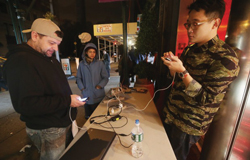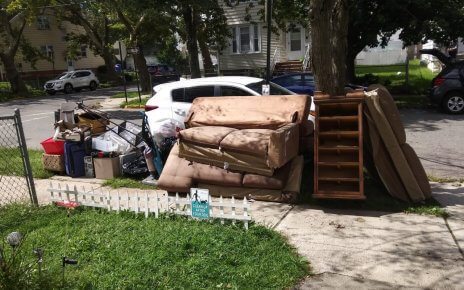In the Midst of Hurricane Disaster, One of Our Biggest Concerns is ‘Will My Battery Die?’
 After two long weeks, the University gets back on its feet as students, faculty, and staff members finally return to their daily routines and fall back in to a s tate of normalcy.
After two long weeks, the University gets back on its feet as students, faculty, and staff members finally return to their daily routines and fall back in to a s tate of normalcy.
Many would agree that the destruction from Hurricane Sandy was unexpected and underestimated, especially by those who faced up to twelve days with out heat or electricity. Jersey Central Power & Light Company (JCP&L) configured power outage maps that reported over 969,000 homes lost power in the state of New Jersey. No TV, no computer, no IPhone charging; just a deck of cards, board games and a radio.
“By day four I was already loosing it. I couldn’t work, no businesses had power, I couldn’t even do my homework because I needed my laptop and Wi-Fi,” said senior Lea Callahan. She wasn’t the only one who felt frustrated from Sandy’s wrath. Student Jamie Cardullo, 19, agreed, “having a few days off to spend time with your family and be unglued from your phone, your job, and Facebook for once was cool and all. I guess I started getting used to it, but that’s when I started to realize how impossible and inconvenient everything was without power.”
This was the worst natural disaster Jersey had ever endured. Students and faculty were nowhere near prepared for the University to be closed for almost two entire weeks.
Many students share similar concerns about how their professors will choose to end the semester, “I’m only worried because having no power stopped me from being able to complete practically all of my school work,” expressed Callahan. As the nights got colder, residents pushed on as they continued to struggle with the power outage. Sandy’s aftermath was a clear indication of just how much our generation relies on electrical power for our education, our jobs and especially our entertainment.
Computers and laptops lacked Internet connection or were inevitably inaccessible. This prevented students and faculty from being able to complete work, access Ecampus, receive emails and surf the web. “I was so bored. I was tired of doing nothing productive and being stuck in a house with all boys,” said commuter Kyla Kendrick, 22.
When I asked how she coped with no electricity or heat for nine days she explained, “we would volunteer during the day and watch movies on our laptops at night, that’s really all we could do.”
As some found ways around boredom by helping their communities or putting a puzzle together, others invented makeshift car chargers with batteries, a speaker wire, and electrical tape. “I sat in my car for 30 minutes at least three times a day just to charge my phone. I figured if I at least had that, I would have the Internet, music, and access to my email and the news, but all I really wanted to know was where I could help,” expressed 18-year-old Mary Cannis, a FEMA (Federal Emergency Management Agency) volunteer.
The development of technology has given us the effortless ability to connect with almost everything and anything, but have we relied on it too much? Sending emails, downloading documents, uploading pictures, browsing Facebook, updating Twitter, it’s all at our fingertips. We have grown accustomed to trusting our electricity to satisfy our everyday wants and needs, “you never thought you’d miss blowing drying your hair or sitting in class for three hours,” laughed Cardullo.
In a crisis situation where electrical systems were down, lack of communication becomes a major issue. Stranded with no power, gas, or electricity, staying in informed during the outage was nearly impossible for some. How did most of the University cope? By turning to their cell phones and social media outlets.
“The only way we knew where to get gas or food was by checking Facebook, Twitter and Instagram every five minutes,” said Kendrick.
Thousands of residents acted as citizen journalists, posting pictures and updating statues with information on the condition of their towns. These major social media outlets allowed us to not only help one another stay updated and informed but alleviate some of the dullness as well. Electricity is a vital component of the ways we communicate with one another.
IMAGE TAKEN from theblaze.com


